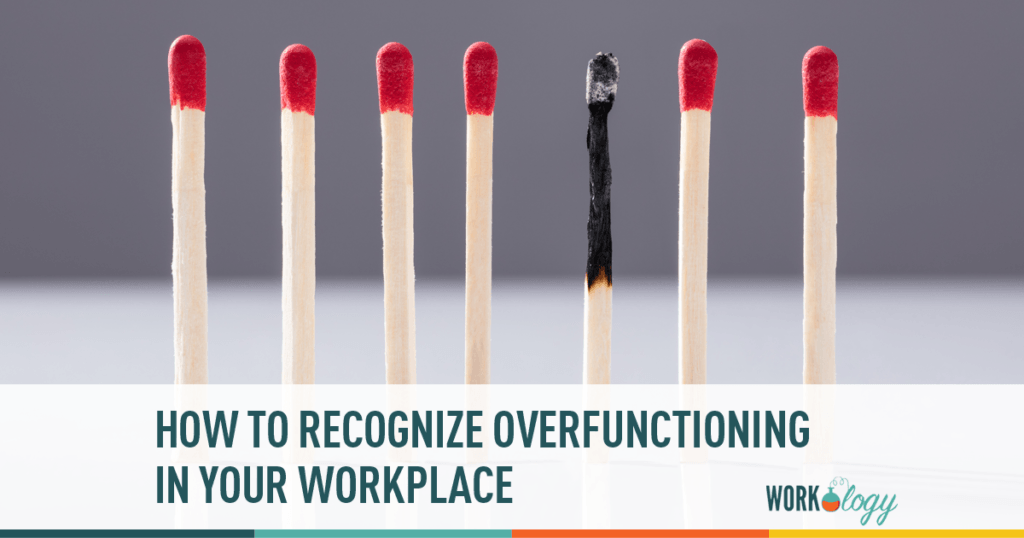Do you feel burdened at work, or like you’re doing more than your share? You may be over-functioning. Taking more responsibility than is reasonable or realistic is sign of over-functioning. If you’re a leader or a hard worker and your tendency is to jump in and do the job, even when it isn’t yours, and you do this over a long period of time, you’re probably over-functioning. You may mean well, but in the meantime, the people you’ve “rescued” are not getting stronger or more capable. In many cases they are starting to do even less work and becoming less competent.
How to Recognize Overfunctioning In Your Workplace
Over-functioning happens when you take on responsibility that is not yours and belongs to someone else. When you over-function for someone else, you’re in effect, doing their job for them. This may seem like a generous or kind thing to do, but it isn’t. It can be harmful to both you and the other person. If you are in a leadership position, the harmful consequences can be far reaching.
Others under-function
The more you over-function the more you enable others to under-function. Many people will happily sit back while you do the work. It’s a lot easier! That way they don’t need to stretch or make an extra effort. They can end up relying on you too much, become too dependent on your expertise, and easily bypass developing their own strengths. If others around you seem to be slacking off, that could be a clue that you’re doing more than is good for either one of you.
Doing the work that someone else owns, can set that person up to feel less capable. If the other person is a high performer and wants ownership of his or her work, he or she may feel undermined and frustrated. These highly motivated people can feel quite de-moralized if they aren’t allowed to stretch out and find out what they can do on their own. If you’re managing a person like this and you tend to over-function or micromanage, it’s important to develop a more hands-off approach.
Get to be heroic
One of the big payoffs of over-functioning is that you can feel heroic. Of course it feels great to come in and save the day, to be the one who knows, the one who can create order out of chaos, and even do things that border on the miraculous! If it feels like others simply cannot do without you, it’s time to look at the possibility that you’re over-functioning. What are you getting out of it? Do you get a little too much enjoyment being the one in control? If so, it may be costing you and those around you, more than it’s worth.
Feel resentful
Think about a time when you picked up the slack or found yourself deciding that you had to do it yourself to get it done right. How did you feel about the other people involved? Was there any resentment or judgment against them? If you feel resentment at someone else’s lack of effort, this can be a tip-off that you’re doing too much. If you’re feeling victimized, or if there are too many times when you feel overwhelmed or over-loaded, you’re probably over-functioning. Even though it may seem easier to jump in and do what needs to be done, in the long term, it’s usually better to address what is going on in the relationship or system that’s setting up the imbalance.
Invest in self-care
How do you feel about yourself when you’re chronically overloaded with doing too much for others? Do you make any deep cuts in your self-care? For example, not getting enough sleep, not eating well, or not exercising in a way that supports you. Self-care and work-life effectiveness usually take a hit when there is too much over-functioning.
When you make a commitment to your self-care, it becomes easier to resist the temptation to take on too much. Self-care is not a luxury. It’s absolutely essential for high performance and balance. Healthy self-care strengthens your core and helps you stay connected with your inner compass. When you make taking care of yourself a priority, you restore your inner balance. This helps you see when enough is enough, where your work responsibilities begin and end, and when to seek out alternatives if you’re tempted to over-function.
Do you recognize the signs of over-functioning? Have you ever felt trapped by it? I’d love to hear any comments on how you’ve dealt with this.










4 Comments
I feel that this is ME. I do alot at work when other’s sit around and watch ME doeing their jobs. FOOEY!
It’s great that you’re seeing this! Do you have a vision for how you could turn this around?
Sometimes people over-function on purpose in order to appear more valuable or to appear a hero. This is similar to Munchausen Syndrome where someone creates crises in order to solve them and be the hero.
This is a great point you’re making. Being heroic can be so seductive. There is also the grey area where a person can solve the problem just enough to look heroic, but not enough to really resolve it. Kind of like job insurance.
Comments are closed.